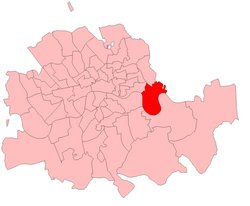| |||||||||||||||||||||
| |||||||||||||||||||||
 | |||||||||||||||||||||
| |||||||||||||||||||||
The 1914 Poplar by-election was a Parliamentary by-election held on 19 February 1914. [1] The constituency returned one Member of Parliament (MP) to the House of Commons of the United Kingdom, elected by the first past the post voting system.
| |||||||||||||||||||||
| |||||||||||||||||||||
 | |||||||||||||||||||||
| |||||||||||||||||||||
The 1914 Poplar by-election was a Parliamentary by-election held on 19 February 1914. [1] The constituency returned one Member of Parliament (MP) to the House of Commons of the United Kingdom, elected by the first past the post voting system.
In February 1914, Sydney Buxton, the Liberal MP for Poplar since 1886, resigned to take up an appointment as Governor-General of the Union of South Africa.
| Party | Candidate | Votes | % | ±% | |
|---|---|---|---|---|---|
| Liberal | Sydney Buxton | 3,977 | 64.9 | +7.7 | |
| Conservative | Ellis Ashmead-Bartlett | 2,148 | 35.1 | −7.7 | |
| Majority | 1,829 | 29.8 | +15.4 | ||
| Turnout | 6,125 | 69.2 | −13.2 | ||
| Liberal hold | Swing | +7.7 | |||
The Unionist campaign was given a boost by the Conservative by-election victory in nearby Bethnal Green South West declared the day before polling day.
Alfred William Yeo held the seat for the Liberal Party with a much reduced majority.

| Party | Candidate | Votes | % | ±% | |
|---|---|---|---|---|---|
| Liberal | Alfred William Yeo | 3,548 | 46.0 | −18.9 | |
| Unionist | Robin S. Kerr-Clark | 3,270 | 42.4 | +7.3 | |
| British Socialist Party | Jack Jones | 893 | 11.6 | New | |
| Majority | 278 | 3.6 | −26.2 | ||
| Turnout | 7,711 | 79.8 | +10.6 | ||
| Liberal hold | Swing | -13.1 | |||
A General Election was due to take place by the end of 1915. By the autumn of 1914, the following candidates had been adopted to contest that election. Due to the outbreak of war, the election never took place.
| Party | Candidate | Votes | % | ±% | |
|---|---|---|---|---|---|
| Liberal | *Alfred William Yeo | 8,571 | 49.4 | ||
| Labour | Samuel March | 4,446 | 25.6 | New | |
| NFDDSS | Wilfrid T. Allen | 4,339 | 25.0 | New | |
| Majority | 4,125 | 23.8 | |||
| Turnout | 36,077 | 48.1 | |||
| Liberal hold | Swing | ||||